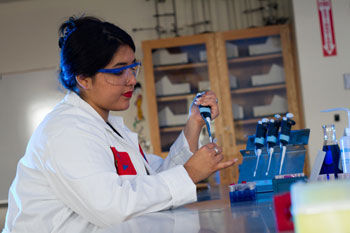Scientific and mathematic exploration at Longwood University is getting a boost from a new summer research program that pairs students and faculty in an eight-week intensive partnership.
The program, called Perspectives on Research in Science and Mathematics (PRISM), is an opportunity for Longwood University students to engage in high-level research as undergraduates. "This is the next step in the development of high-level research at Longwood," said Dr. Melissa Rhoten, professor of chemistry and PRISM director. "It underscores the commitment this university has made to developing a strong undergraduate research profile and promoting top-notch academic achievement."
Students will receive a $3,500 stipend in addition to room and board for the duration of the eight-week program. The competitive application process highlights student interest in the new program—14 students will participate in summer research on 11 strategically focused projects.
In keeping with a statewide emphasis on science, technology, engineering and math (STEM) education, PRISM promotes research in biology, neuroscience, environmental sciences, physics, chemistry and mathematics. In 2012, the United States Chamber of Commerce listed Virginia first nationally in STEM job concentration—a statistic not lost on the program organizers at Longwood. "Students who are involved in this program will not only have a leg up on their peers in terms of research experience, but also will be top candidates for STEM jobs right here in Virginia," said Rhoten. "They will develop real opportunities for themselves."
Focusing on intense research and tangible results, student participants will work at least 40 hours per week in the lab and will present their research to peers and faculty members to be critiqued both during and after the program. Many of the PRISM projects are the continuation of student-involved research conducted during the previous semester.
Based on the graduate school model, PRISM aims to put students at the center of the research process. "Students are in the lab every day working on projects, identifying and exploring tangents they want to pursue. They report their findings to faculty and other interested parties and are critiqued by their peers—this really raises the bar," said Rhoten.
"This program will give our students the opportunity to work on high-level research with some of the university’s best faculty members," said Dr. Chuck Ross, dean of Cook-Cole College of Arts and Sciences. "This type of student-faculty collaboration not only represents the sort of deep engagement that makes the Longwood experience memorable but will also allow our students to be very competitive for STEM-related graduate programs and employment."
The projects that students will be involved in this summer are
- The creation and characterization of chimeric antigen receptors targeting the PD-1 receptor: Dr. Amorette Barber, Byron Keck and Emily Whitman.
- Development of a modular expression vector system that can shuttle between budding yeast species: Dr. Dale Beach and Heaven Cerritos.
- The effect of a Jupiter-like planet on small Earth-like planets: Dr. Rodney Dunning and Jason Freischlag.
- An investigation of the effect of biodiversity on the storage of organic carbon in the sediments of small ponds: Dr. Ken Fortino and Leanna Tacik.
- Pup recognition in the rat: Dr. Adam Franssen and Alexandra Hauver.
- Designing luminescent lanthanide sensors for capsaicinoids: Dr. Chris Gulgas and Christopher Gerace.
- The development of chromatographic methods for the identification of smokeless gunpowders and gunshot residues: Dr. Sarah Porter, James Mello and Savannah Barnett.
- Engaging in action research to inform mathematics instruction in a university precalculus course: Dr. Leah Shilling-Traina and Karen Green.
- Studying the geometry of the Heisenberg space Nil3 using the Fels-Olver approach to moving frames: Dr. Thomas Wears and Joseph Gills.
- A determination of the short-term and long-term effects that specific agricultural contaminants have on aquatic life: Dr. Wade Znosko, Nicholas Carrara and Krista Ellis.
- Distribution of galactic dark matter temporarily captured into solar orbit: Dr. Gary Page and Paul Clamp.



Leave a Comment